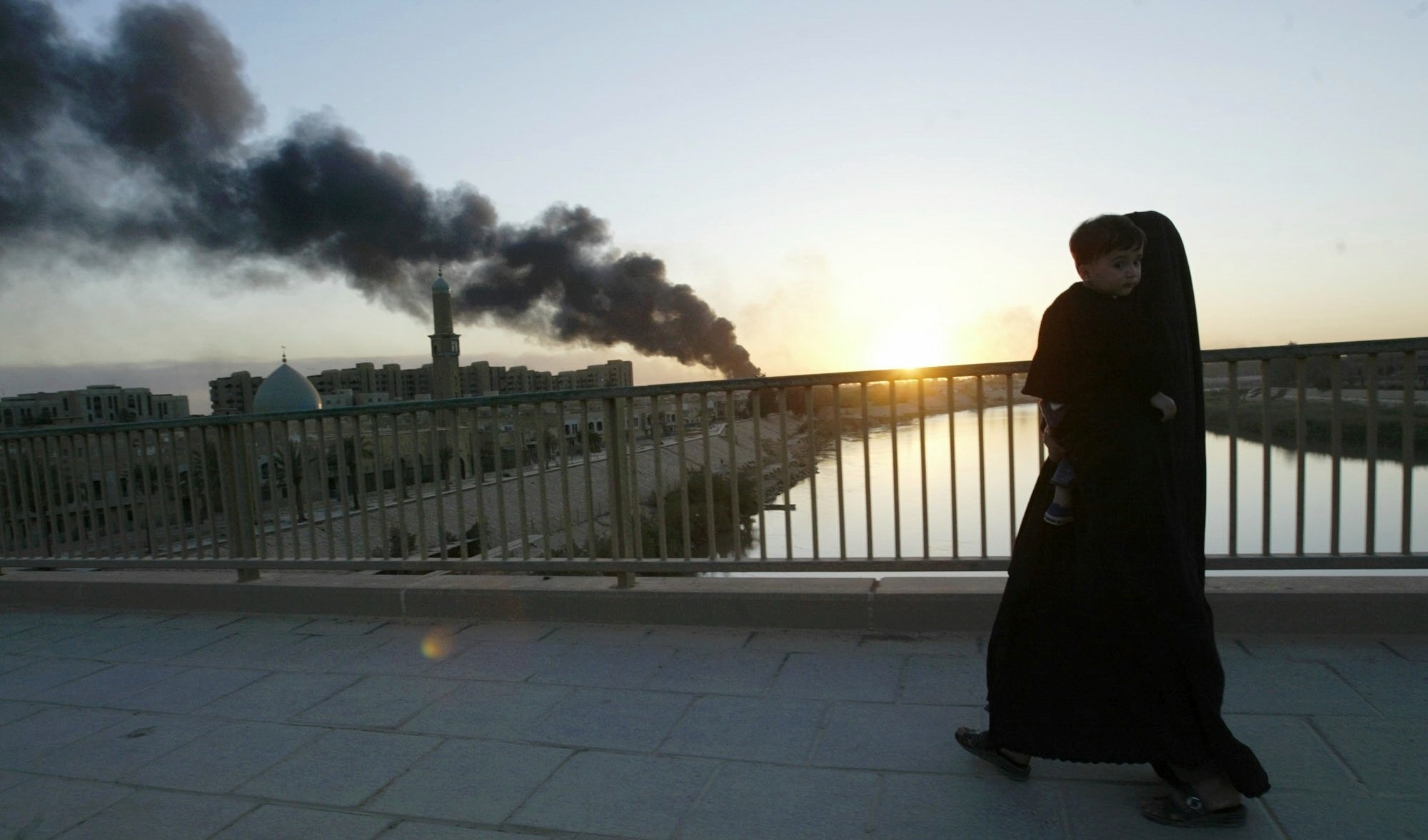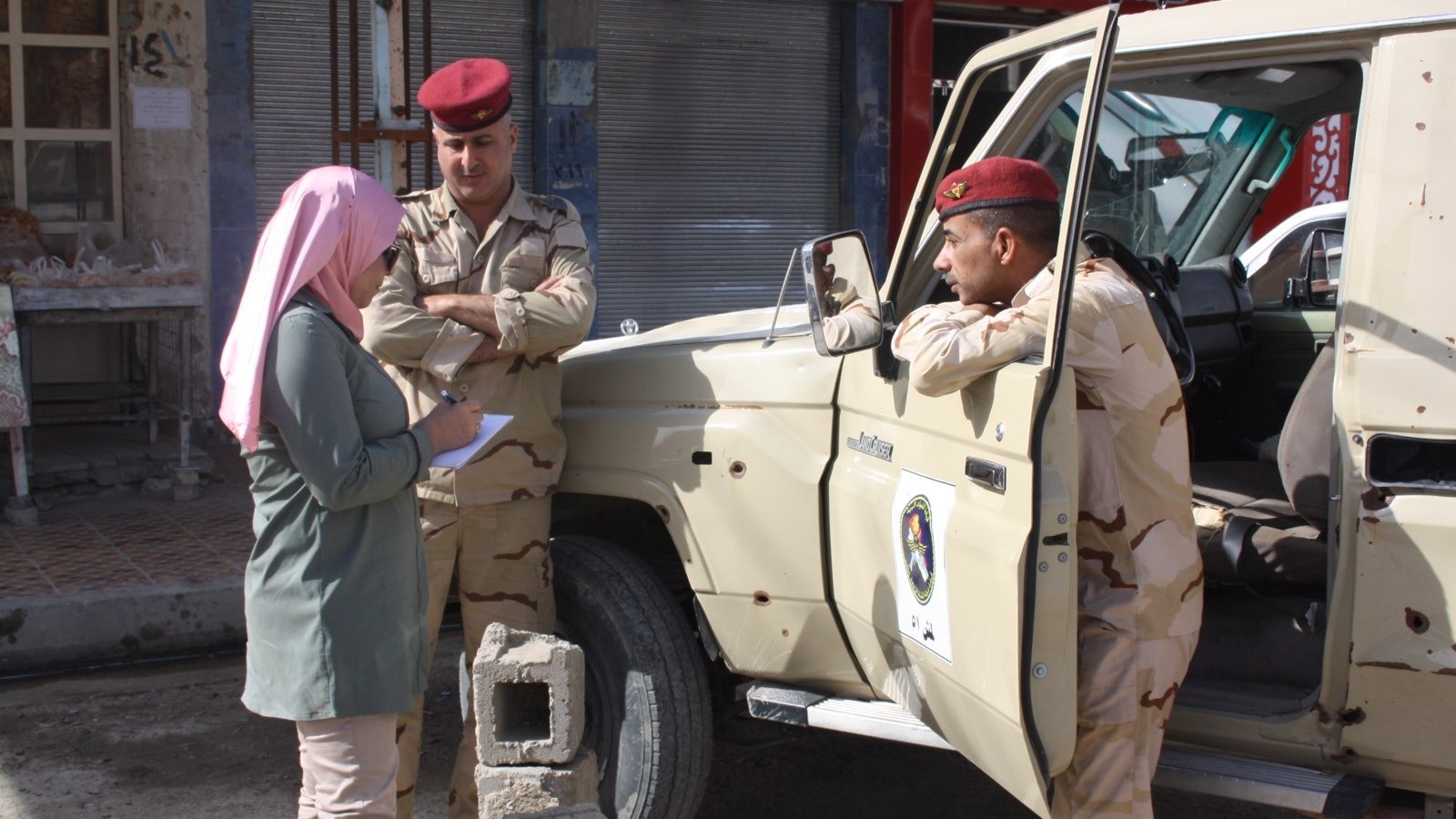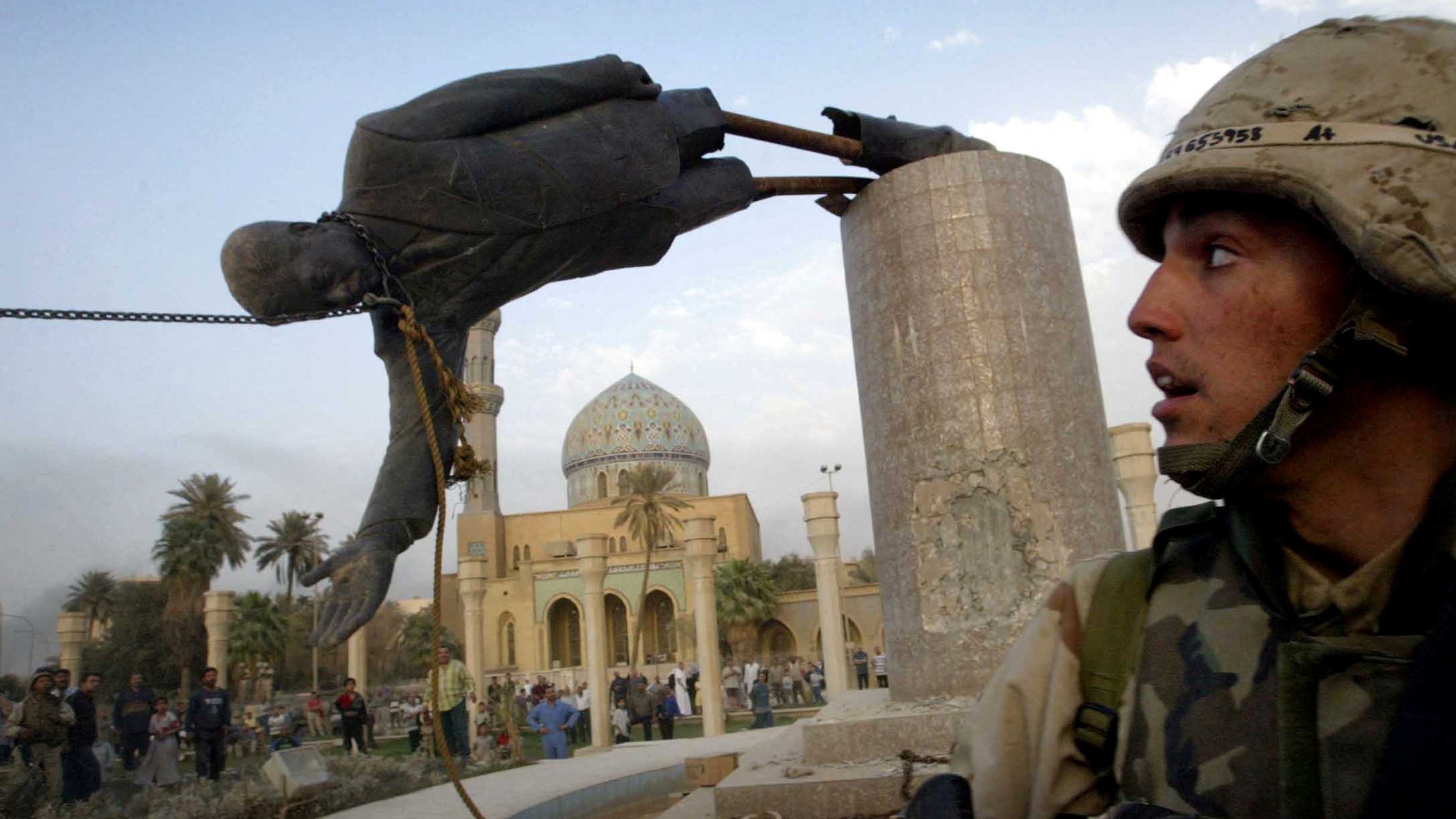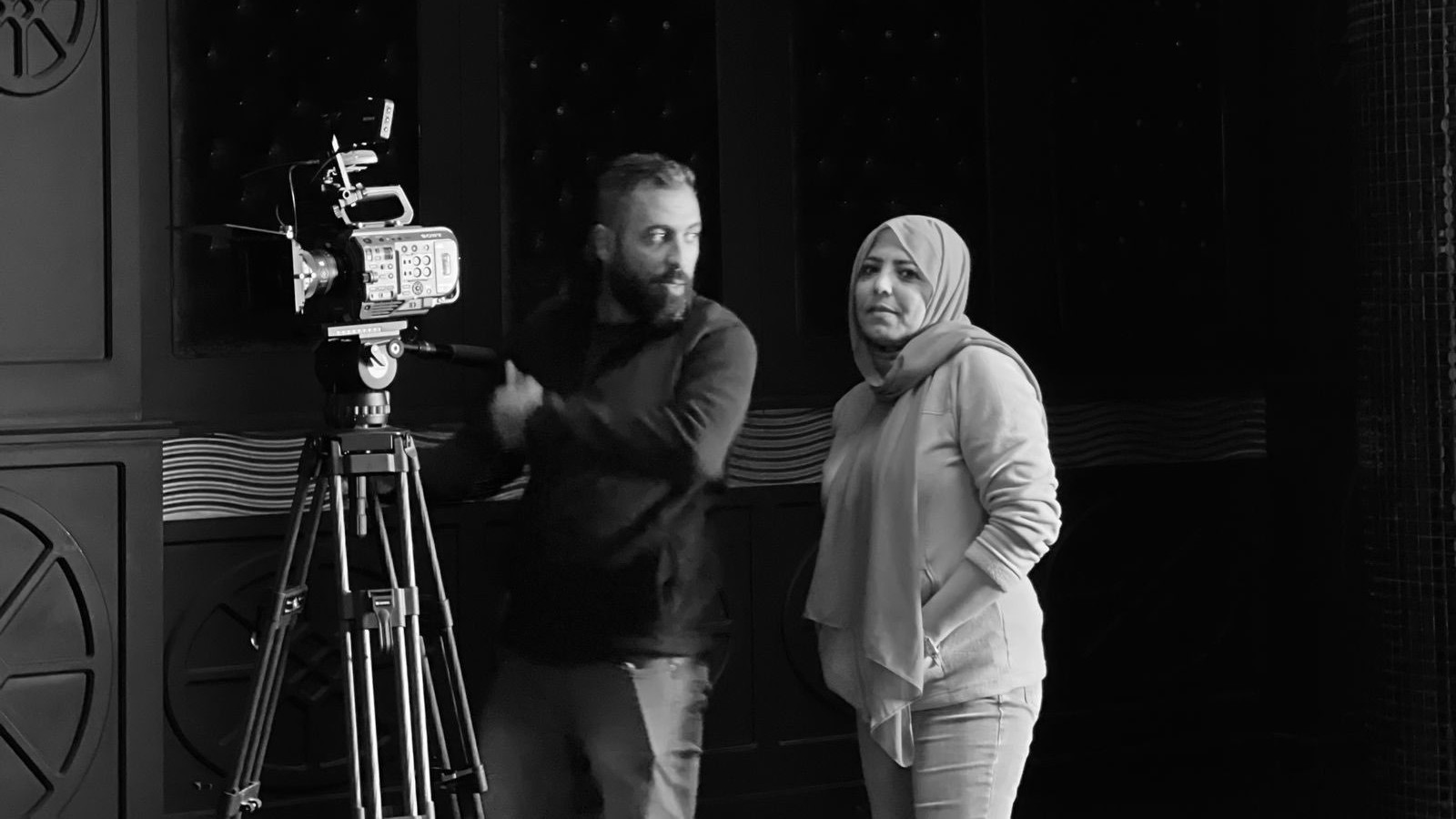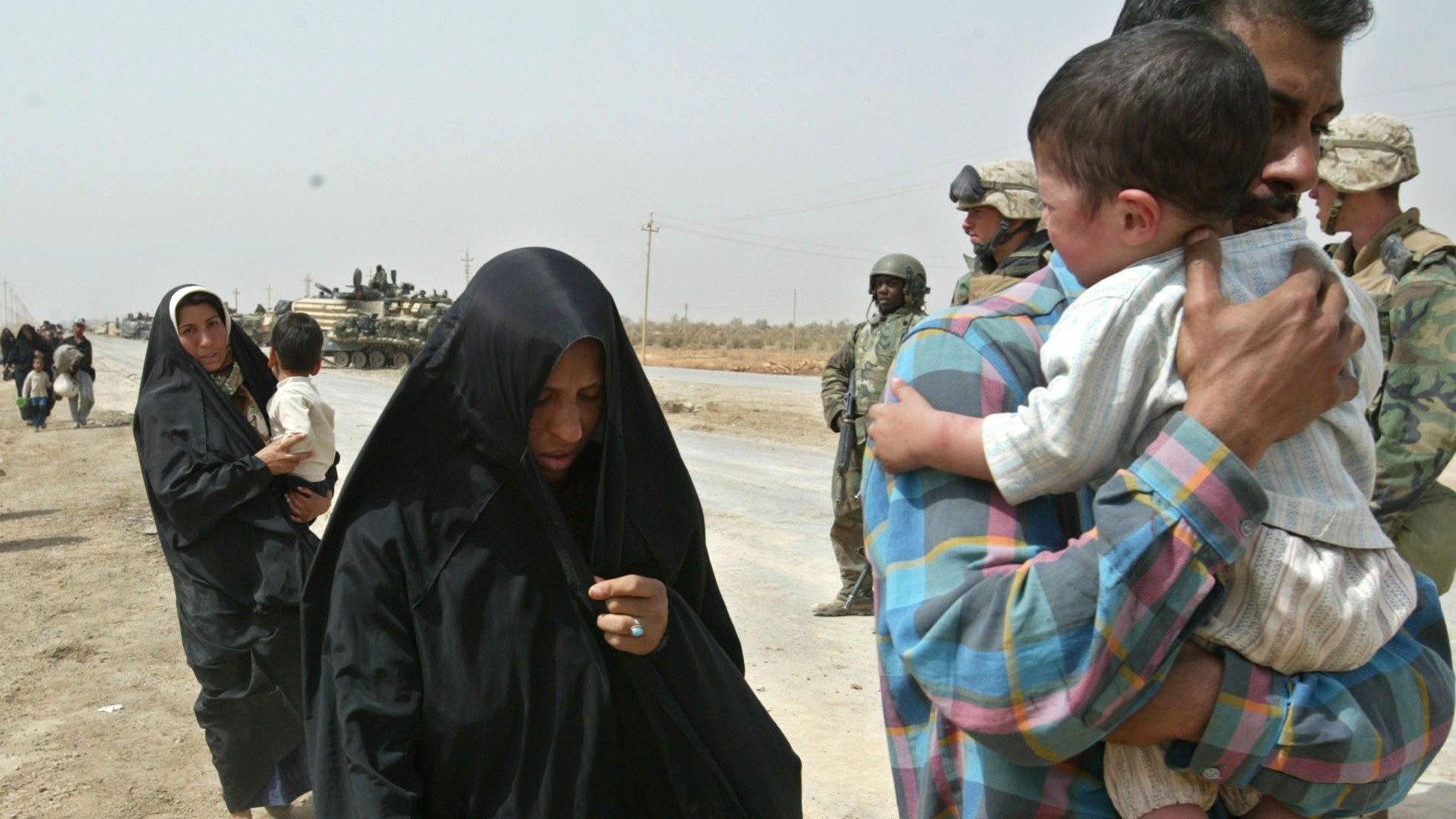
Ten days that changed Iraq - and me - forever
In 2003, March was different. Baghdad seemed almost empty, burdened with worries and sadness. The successive dust storms of spring had clothed it with a heavy mask that hid the feelings of exhaustion and futility.
I was a reporter at a local Iraqi weekly newspaper at the time of the US-led invasion. My editor asked me to cover people’s preparations for war and the upcoming battles in southern Baghdad.
Every briefing was dominated by whispered and off-the-record conversations. Officials spoke about the shortage of ammunition and the fearsome weapons and equipment Iraq’s army expected to face. But who dares to speak publicly or publish such things in the media?
On the record, leaders trumpeted imaginary victories that they would achieve over the invading forces. The moment the camera and recording devices were switched off the truth came out - everyone was terrified.
The Americans began their invasion in the south. Telephone lines with the southern governorates had been almost completely cut off, and once the US-led forces bombed the radio and television building and the backup transmitters, broadcasts ground to a halt.
Stay informed with MEE's newsletters
Sign up to get the latest alerts, insights and analysis, starting with Turkey Unpacked
Yet the news of the battles in Basra and Nasiriyah were reaching us one way or another. The fighting was fierce, but the coalition forces were advancing.
I was living in my parents’ house in southern Baghdad at the time.
Weeks before, the area had been turned into a military barracks. The Iraqi army used the primary school over the road as a base, while deploying dozens of tanks, heavy artillery and anti-aircraft guns in the surrounding open lands.
On 3 April, I had to cross the street to take a taxi to the frontline, where my editor asked me to cover the battles. As was my custom in those days, whenever I left the house, I said goodbye to everything in it, not knowing if I would ever return.
I nearly didn’t. After a few steps an explosion ripped through the street and covered everything with dust. A shell or a missile had hit one of the nearby tanks. The battles had reached Baghdad.
I was terrified. This was the first time I’d ever seen a bombing in front of my eyes.
All I remember about the Iran war was the bodies of martyrs wrapped in the Iraqi flag and the wailing of their families. In the Gulf War, I remember the sounds of blasts, the sight of warplanes bombing from the air, and the massive destruction they left behind. But this time it was different. I was there, all by myself.
I had to decide whether to go back to the comfort of my family or walk on, fulfilling my duty as a reporter. Would my fear defeat me?
This paralysis lasted just a few seconds. My parents must have heard the explosion. If I come back now, I thought, they won't let me out again. I wanted to be part of the event; to offer something for my country, to use my beliefs and convictions. Didn't they teach us that the homeland deserves all kinds of sacrifices? Was this not the essence of what I had studied and learned over the past 25 years? How can I expect the soldier to continue to defend me when I think about fleeing at the first sign of danger?
Yes, this was me. I adopted such silly ideas.
Anyway, I made up my mind and moved forward without looking back.
Forced to flee
At al-Rasheed, a town 15km south of Baghdad, chaos reigned. Aerial bombardment got heavier with every hour, and US troops were being air dropped here and there.
I’d been moving around the front, filling my notebook with scenes of destruction and fear. Suddenly, the streets were empty. Everyone had fled and I was alone. I had to get home before I was stranded.
When I got there, everyone was standing in the garage. It took me a few seconds to understand what was going on. My father was forcing my family to leave.
Blasts were hitting nearby in ever-shorter intervals, shaking the earth beneath us. Though our neighbourhood was full of tanks and Iraqi troops, we so far seemed to have been spared. Maybe because the soldiers there hadn’t fired a single shot at the Americans.
It was clear the bombs would come eventually.
Everyone tried to convince my father to leave with us, but he refused.
We wept, and told him we must all live or die together, but his stubbornness won through
He could be very dictatorial, and once his mind was made up he refused to consider any objections.
My father was a textile merchant who had a number of shops in a major Baghdad market. I’d never seen him so exhausted and resigned.
He was caught between two fires: on one side he had to protect his family, and on the other he needed to protect his property.
Like the merchant he was, he chose to send his family to safety and stay and look after his wealth.
We wept, and told him we must all live or die together, but his stubbornness won through. Iraqis had been told that American soldiers were rapists, and the fear of that shame was too much for him to bear. Little did he know that two of my brothers, Mustafa and Murtada, hid somewhere without him knowing, so he wouldn’t be alone.
I watched it all silently. My disappointment was even greater than my fear. My brain was working differently. Maybe still is.
My mind was trying to store as many details and feelings as possible, not pausing to process what was going on around me, sucking in every event, image and conversation.
No way out
So we left, hoping to find a route south where a house had been prepared in case we needed to flee.
More than 20 of us, mostly women and children, crammed into a double-seater pickup truck. My brother Muhammad took the wheel. Barely 25 years old, he had never taken responsibility for himself, let alone his family.
It soon became clear that my father did not choose his timing well. US forces had been dropped on all roads leading south, cutting Baghdad off.
Muhammad drove frantically, trying to find a gap in the US line, probing the small, unpaved roads that led out of Baghdad through farmland of dense citrus plantations. No luck.
In the fields, Iraqi soldiers fled flaming tanks. Some took their military jackets off, trying to disguise their identity, though the cold was biting.
Muhammad ignored all the signs of danger around us and drove towards the main road between Baghdad and Babel. Bursts of American gunfire rained down on us, forcing him to turn around and drive as fast as he could.
When the gunfire stopped, so did we, anxious to count our losses. Thank God there were no injuries. It seems that the shooting was just a warning.
It was about six in the evening. We were hungry, broke, scared and without a destination.
Like most Iraqis, Muhammad was never asked whether he wanted this war. He was never able to give his permission for the experiment he was just subjected to. He was drowning in worry.
When we began to drive again, the car swayed along the dirt road very slowly, as if it was carrying all the weight of the world on its back.
A weary fleeing Iraqi soldier grabbed on, desperate to lighten the load on legs that could no longer bear him.
I still remember the coldness of the earth, a chill that used to creep into my body whenever I tried to sleep
I offered him some water. Later we would learn his name was Hashem. He was thin, in his 20s, and his features could barely be seen behind a veneer of dirt and gunpowder.
Hashem leaned back and drank water with a strange pleasure that was out of proportion to the place and time, as if he was tasting a fine wine.
We all submitted to Hashem’s silence, respecting his strange meditation rituals.
Ten minutes later, Hashem quietly suggested that we go with him to Diyala, a province northeast of Baghdad.
"You guys need a destination, and I need a car to take me home. Why don't we go together?" he said.
He had no idea what he was giving us. For Hashem, he was trading a service for a service. In fact, he had pulled us all out of a vortex of loss in which we had been spinning for hours, if not decades.
The plan created excitement. Especially for Muhammad, who finally relaxed and regained some of his spirit, cracking jokes and teasing the kids.
This worn-out and defeated soldier had given everyone a temporary sense of reassurance.
Lost dignity
The distance between Baghdad and the Diyala district of Hibhib, where Hashem’s village was located, is no more than 60km.
Usually it would take about an hour to get to. But we were just one of tens of thousands of vehicles ferrying panicked families away from hell.
Cars spread out across the flat lands beyond the city, covering every inch of earth like metal paving.
The eyes of the city’s fleeing residents were lifeless, lost and weary.
I can remember the silence. Thousands of vehicles squeezed together but none of them making a sound. No horns, no conversations, no grumbling, no requests. Even the children had no voice. Everyone seemed resigned to their unknown fate.
Hashem’s family received us in the best possible way: no questions. For Iraqis in difficult circumstances, even asking about their plight can be seen as an insult.
Though the children were asleep in warm beds, that night passed heavily. There were no mobile phones in Iraq at that time, and phone lines had been completely severed. We had no way of finding out what happened to my father and my brothers, and they knew nothing of us.
Finally, the sun rose. We asked Hashem to allow us to leave, wary of being a burden on this impoverished family. But they refused, and after long, sometimes angry, discussions, they suggested that we stay in a building under construction on a nearby farm.
Our new home consisted of one room made of bare bricks. There were no tiles on the floor, no electricity or water, and the windows and door were yet to be attached. But it was perfect, for a few hours at least.
After three days, Muhammed went to Baghdad to seek out our father. Instead, he returned with one of my father’s business partners and his family, who joined us in our shelter, bringing food and blankets we used to cover the damp and dirty floor.
At night, heavy cold air followed the dark. Though this corner of rural Iraq was almost silent, the echo of explosions began to greet our ears from time to time.
We didn’t have enough blankets, so divided into two groups: one who slept in the day, another at night.
I still remember the coldness of the earth, a chill that used to creep into my body whenever I tried to sleep. Whatever we put beneath us couldn’t protect us from the damp, muddy ground.
The only source of fresh water was 3km away, and our lives began to resemble those of stray dogs, lapping up wastewater and relieving ourselves in the open. At least stray dogs do not feel their lost dignity, because, after all, they know that they are dogs.
We stayed there for ten days. It might as well have been ten months, or a decade. Every day I prayed this nightmare would end. I no longer wanted anything but to go home. I no longer cared who ruled or who ruled what.
Who could possibly care anymore about such nonsense as a US invasion and Iraqi sovereignty? Nothing made sense anymore.
Learning the hard way
When we returned to Baghdad it was still on fire. Dozens of corpses lay in the streets, and American soldiers were everywhere. Those sights stirred nothing in me.
In fact, I felt nothing as each major event was followed by another one. I did not much care about the fall of Baghdad, or that the country was now in the hands of the Americans.
That’s not to say that what followed didn’t make me sad, heartbroken or angry at times. But nothing changed me in the way those ten days did.
After those nights of terror and the humiliation of displacement, I was no longer the same person
After those nights of terror and the humiliation of displacement, I was no longer the same person. Things were no longer what they used to be. The concept of sacred and precious changed forever.
Whatever I felt about the bonds between me and places, people, ideas, institutions and power had completely altered.
I learned - the hard way, unfortunately - that human life is more valuable than anything else in the world. I also learned that life’s greatest achievement is having choices, and that no one gives you what you deserve for free.
Those early days of the Iraq war have ruled my life and determined my paths. All the battles I have fought since aim at one thing: preserving my right to choose and preventing any person, regime or authority from taking this right away from me.
Millions of Iraqis and non-Iraqis have lived and are still living the same or similar experiences. Many even harsher.
For two weeks, I have been receiving dozens of requests to talk about the 20th anniversary of the US invasion of Iraq. Most of them I ignored. Not because I have nothing to talk about, but because the memory of the invasion is like some great, deep wound, the worst to strike me since I was born, and I’m still trying to recover from it.
Nothing can prepare you for the moment you discover your true value to those that rule you and world leaders who describe themselves as advanced and moral.
How are you supposed to recover from understanding that, to Saddam Hussein and the invading American army, you have the same rights as those scrawny stray dogs? I’m reminded of it every time I see one on the street.
This is what the 20th anniversary of the US invasion of Iraq means to me, and this is what the Americans have still not grasped, that the impact of their actions stays with people for a lifetime.
We Iraqis had no choice when America decided to go to war. But whatever happened, since March 2003 we now at least have options. We can be state-builders or gangsters, fighters or civil servants, serve foreign powers or serve ourselves. The choices are there, though they may not be easy.
Middle East Eye delivers independent and unrivalled coverage and analysis of the Middle East, North Africa and beyond. To learn more about republishing this content and the associated fees, please fill out this form. More about MEE can be found here.


